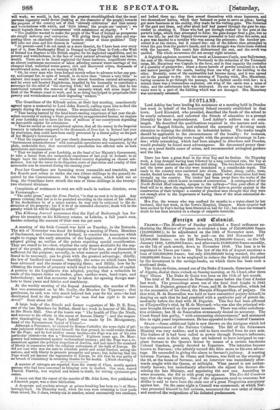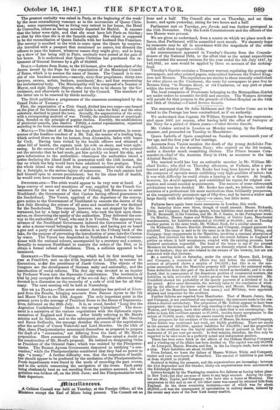goreign anti etilonial.
Fnarecn.—The Moniteur of Sunday published a Royal ordinance au- thorizing the Minister of Finance to contract a loan of 250,000,000 francs (10,000,0001.); to be adjudicated on the 10th of November next. The different instalments are to be paid—on the 22d November 1847 12,500,000 francs; on the 22d December, 12,500,000 francs; on the 7th January 1848, 5,000,000 francs; and afterwards 10,000,000 francs monthly, on the 7th of each month, down to November 1849. The loan is to be negotiated in Three per Cents. The law of the 8th of August sanctions a loan of 350,000,000 francs; but only 250,000,000 being wanted, the other 100,000,000 francs is to be employed to reduce the floating debt produced by the investment in the savings-banks, on which there has been such a continued drain.
The Duke de Guise, second son of the Duke d'Aumale, Governor-General of Algeria, died at three o'clock on Sunday morning, at St. Cloud, after three days' illness. The Duke de Guise was born on the 1 1 th of last month.
The trial of M. Rosemond de Beauvallon came before the Cour d'Assize last week. The proceedings arose out of the fatal duel fought in 1845 between M. Dujarier, gdrant of the Freese, and M. de Beauvallon, which led to the accusation of his friend, the Marquis d'Ecquevilley, of perjury. On that trial, M. de Beauvallon was held to have committed perjury himself, in denying on oath that he had practised with a particular pair of pistols im- mediately before the duel with M. Dujarier. This fact had been affirmed on d'Ecquevilley's trial, by M. de Meynarcl; who was also the principal wit- ness brought forward on the present occasion. There was other corrobora- tive evidence; but M. de Beauvallon strenuously denied its accuracy. The Court found him guilty, " with extenuating circumstances," and sentenced him to eight years' imprisonment. He has appealed to the Court of Caseation
Sr.UN.—Some additional light is now thrown on the intrigues which led to the appointment of the Narvaez Cabinet. The fall of the Salamanca Ministry was very sudden; and is said to have resulted from its own acts. The leaders of it bad been called to power through Serrano's influence; but when once in their seats, they are believed to have intrigued to sup- plant Serrano in the Queen's favour by means of a certain handsome Colonel Ganders, greatly devoted to Espartero. The intention became known to Narvaez; who adroitly turned this false move to his own advan- tage. He succeeded in giving the alarm to Serrano's jealousy. A meeting between Narvaez, Ros de Olano, and Serrano, was held on the evening of the 3d, at the house of Serrano; and an interview was immediately after- wards sought with the Queen, at midnight. What passed is not authen- tically known; but immediately afterwards she signed the decrees dis- missing the late Ministry, and appointing the new one. According to some accounts, she did so with great repugnance. -The Eco del Comercio says that she wept bitterly. One of the arguments used to overcome her dislike is said to have been the stale one of a great Progresista conspiracy against her. On the same night a Council was summoned; at which Nar- vaez presented himself in full uniform, announced the new order of things and received the resignations of his defeated predecessors. The greatest curiosity was raised in Paris, at the beginning of the week' by the most contradictory rumours as to the movements of Queen Chris- tina; some representing her as living very retired in her house, the Hotel de Conroenes, others as having actually departed for Madrid. It appears that the latter were right, and that she must have left Paris on Sunday; so that by this time she is at the Spanish capital. Her object is supposed to be the reconciliation of Queen Isabella with her husband Don Francisca Her secrecy is ascribed to the wish to come upon the Queen by surprise: she travelled with a passport that mentioned no names, but directed the officers to pass the bearers, whatever names they might give; and to keep up a show of her being still in Paris, sentinels were posted at the gate of her house. It is understood that Queen Christina has purchased the re- tirement of General Serrano by a gift of 50,0001. Imux.—Letters from Rome, to the 2dinstant, give the particulars of the decree issued by the Pope for the organization of the Municipal Council of Rome, which is to assume the name of Senate. The Council is to con- sist of one hundred members,—namely, sixty-four proprietors; thirty-two lawyers, swans, artists, bankers, merchants:. &e.; and four representing the ecclesiastical body. The Municipality will be composed of a Senator or Mayor, and eight Deputy-Mayors, who were first to be chosen by the Go- vernment, and afterwards to be elected by the Council. The members of the latter are to be renewed by thirds annually. The Siecle publishes a programme of the measures contemplated by the Grand Duke of Tuscany— First, the organization of a Civic Guard, divided into two corps—one formed on the plan of the German Landwehr, and liable to take the field; and the other sedentary, destined to guard the town. Secondly, the augmentation of the army, with a corresponding materiel of war. Thirdly, the establishment of municipal- ities, founded on the principle of popular election. Fourthly, the establishment of provincial councils, also elective. Fifthly, a central representation, organized according to the form circumstances will suggest. Mstas.—The island of Malta has been placed in quarantine, in conse- quence of the heedless conduct of a Mr. Tait, the master of a trading brig, which arrived there on the 1st instant, from Alexandria, laden with beans for Cork. Having been visited by the health officers and obtained a clean bill of health, the captain took his wife on shore, and went sight- seeing. In the course of his stroll he called on his consignee; who pointed out the mistake that he had made, got him quickly on board his ship, and gave information to the authorities: whereupon the authorities issued a notice declaring the island itself in quarantine until the 15th instant, the day on which the brig would have been admitted to free pratique. Thus the whole island was shut out from any communication with the world for a fortnight, to the serious injury of commerce. The rash captain had laid himself open to severe punishment: but for his clean bill of health, he would even have incurred the penalty of death.
Swirxnutswn.—The crisis would appear to be very near at hand. A large convoy of arms and munitions of war, supplied by the French Go- vernment for the use of the Canton of Friburg, left Besancon to enter Neufchatel; the Government of that Canton having offered guarantees to the Sonderbund. The Vorort, apprized of the departure of the convoy, gave notice to the Government of Neufchatel to execute the decree of the 31st July directing the seizure of all arms and munitions of war destined for the Sonderbund. The convoy, however, was not stopped by the Go- vernment, but by a large body of citizens, who took the task upon them- selves, on discovering the apathy of the authorities. They delivered the con- voy to the authorities of Vaud, who sent it to Yverdnn. The apparent con- nivance of the Neufchatel Government induced. the Government of Vaud to seize a steam-vessel belonging to the former; and having put on board a gun and a party of carabineers, to station it on the Friburg bank of the lake, for the purpose of preventing the introduction of arms into the Canton by water. . The Vorort has despatched to Neufchatel a Federal Commis- sioner with the national colours, accompanied by a secretary and a notary, formally to summon Neufchatel to execute the orders of the Diet, or to obtain a formal refusal of obedience. Thus, a collision appeared to be imminent.
GERMANY.—The Germanic Congress, which had its first meeting last year at Frankfort, met on the 27th September at Lubeck, to resume its discussions, under the presidency of Jacob Grimm. The objects of the Congress are the development of German unity and nationality, and the introduction of social reforms. The first day was devoted to an inquiry by Professor Warm into the Hanseatic Confederation. The institution of trial by jury occupied the morning of the second day; the afternoon being devoted to a discussion on the necessity of a code of civil law for all Ger- many. The next meeting will be held at Nuremberg. Rio DE LA Pt...Yrs.—The screw steamer Antelope has arrived at Liver- pool from the Brazils, bringing accounts from Buenos Ayres to the 7th and Monte Video to the 13th August. The only important point in the present news is the message of President Roses to the House of Representa- tives, delivered on the 28th July. It is, as usual, headed "Long live the Argentine Confederation! Death to the savage Unitarians!" The docu- ment is a narrative of the various negotiations with the diplomatic repre- sentatives of England and France. After briefly referring to Mr. Hood's mission and its failure, and to the subsequent proceedings of Mr. Ouseley and Baron Deffaudis, the message sketches the course of the negotiations after the arrival of Count Walewski and Lord Howden. On the 13th of May, these Plenipotentiaries announced themselves as prepared to propose the draft of a " convention," not differing from the basis of Mr. Hood's proposition. Here commenced the difficulties. Roses raised a doubt on the construction of Mr. Hood's proposal. He insisted on designating Oribe as President of the Oriental State; which was resisted by the Plenipoten- tiaries. The Buenos Ayrean Government demurred to ratifying " a con- vention," while the Plenipotentiaries considered that they had no power to sign "a treaty." A further difficulty was, that the suspension of hostili- ties should appear to be produced by the mediation of the Plenipotentiaries. Fresh impediments were found in the mode of recording the past events, and in the article concerning the navigation of the rivers. Each party being obstinately bent on not receding from the position assumed, the ne- gotiation was broken off, on the 29th June; and the Plenipotentiaries took their departure.



























 Previous page
Previous page